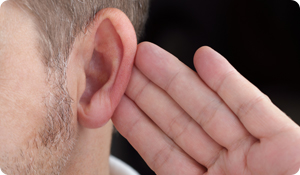
If you have diabetes, you're twice as likely to experience hearing loss as someone without the disease, according to the National Institutes of Health. And individuals with pre-diabetes are also at risk: It's believed that the incidence of hearing loss among the 79 million adults with prediabetes is nearly one third higher than it is among those who don't have the condition.
Why is hearing loss so common in people with diabetes? The tiny blood vessels and nerves located in your inner ear must work well for you to hear well, but high blood sugar levels can actually damage these over time. When this happens, your ability to hear is reduced.
"If you are diabetic, your hearing is at risk because blood vessels in the ear are very narrow," says Elizabeth Dinces, MD, MS, attending physician and assistant professor of otology at Montefiore Medical Center in New York City. "The cells are at risk for dying early if they don't get the proper blood supply."
Hearing loss can be gradual, and your family may notice it before you do. Some telltale signs include trouble following a conversation involving more than two people, constantly turning up the TV volume so it seems too loud for others in the room, problems hearing the voices of young children and women, and the feeling that others are mumbling.
Other factors—like a buildup of ear wax and increasing age—also can affect your hearing, says Joel Zonszein, MD, director of the Clinical Diabetes Center at Montefiore Medical Center. "One third of people between 65 and 74 have some hearing loss," he says. "It's less common in younger people." Close to half of all people age 75 and over have some hearing loss.
Fortunately, there are strategies to protect your hearing:
Reduce your exposure to loud music and loud sounds, Dinces cautions. "Even sounds that are not painfully loud but are still loud over several hours of exposure can contribute to hearing loss," she says. If you're in a noisy place such as a wedding reception or concert, take occasional breaks. "Take a 15 minute time out to give your ears time to recover," Dinces suggests.
Remember that the effects of very loud noises on your ears accumulate over your lifetime. Be mindful about how loud you turn up the car radio, or at what volume you listen to your iPod.
While there are no current recommendations for how frequently, you should have a hearing screening. Dinces says, if you notice any problems with your hearing, see your doctor right away.
If the problem turns out to be earwax buildup, a doctor can remove the wax. But the most common type of hearing loss, known as sensorineural hearing loss, is the type that is typically found in individuals with diabetes. While in most cases it cannot be cured, it can usually be treated with hearing aids, tiny electronic devices that are worn in or behind the ear. While these can be helpful, only one in five people who require a hearing aid uses one, reports the NIH.
Dr. Amber Taylor reviewed this article.
Sources:
"Diabetes and hearing loss." American Diabetes Association.
http://www.diabetes.org/living-with-diabetes/seniors/hearing-loss/
"Dealing with hearing loss." December 2007. News in Health. National Institutes of Health.
http://newsinhealth.nih.gov/2007/December/docs/01features_02.htm





